Key takeaways
- Marxism critiques capitalism by highlighting economic inequalities and class struggles that shape global politics.
- Core concepts such as surplus value and historical materialism challenge traditional views of societal change and emphasize the link between economic conditions and political systems.
- Applying Marxist analysis in studies reveals underlying economic motivations in political events and encourages critical thinking about power dynamics and exploitation.
- Understanding Marxism fosters a sense of responsibility and curiosity about promoting justice and equality in global contexts.
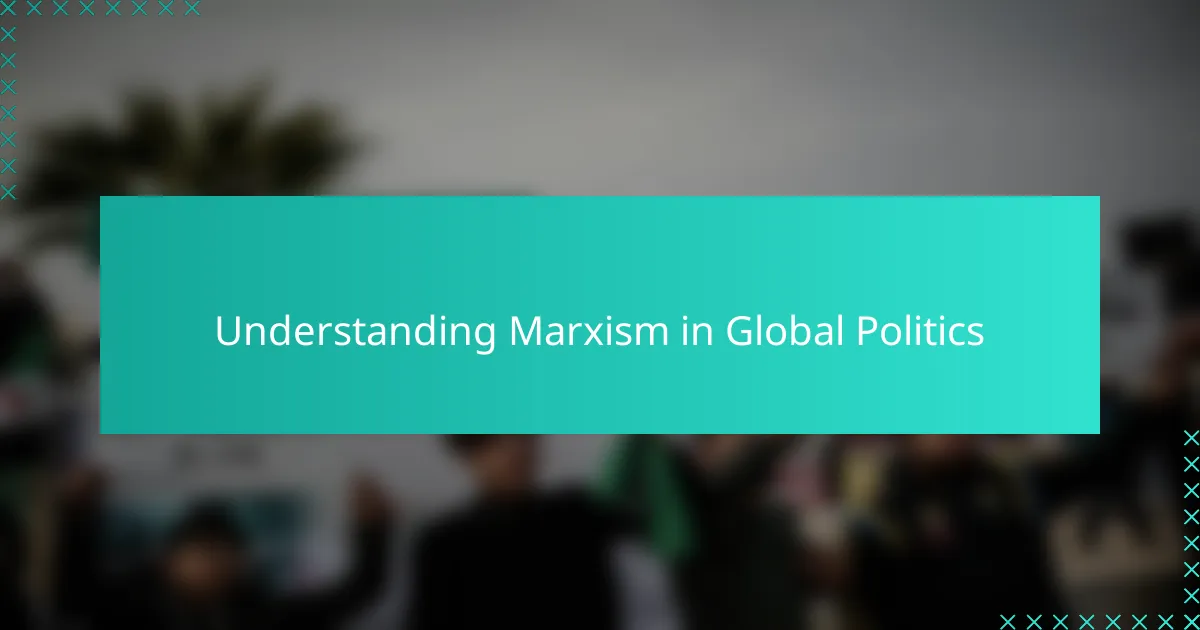
Understanding Marxism in Global Politics
When I first encountered Marxism in my global politics class, I was struck by its bold critique of capitalism’s impact on societies worldwide. It made me question the economic inequalities I had always taken for granted—why do some countries thrive while others remain trapped in poverty? This perspective pushed me to look beyond surface-level politics and consider the deeper forces shaping global interactions.
One thing that stood out to me was how Marxism frames history as a struggle between classes, which suddenly made sense of conflicts I had seen in news reports but never fully understood. I realized these struggles weren’t just random events but part of a larger pattern linked to economic power and control. Hasn’t it often felt like the world’s problems stem from imbalanced power structures? Marxism offers a lens to explore these very concerns.
What resonated emotionally was the idea that the global political order isn’t fixed but deeply influenced by the interests of the ruling class. It made me wonder—how can lasting change happen if we don’t address who controls wealth and resources? This insight has stayed with me, guiding my exploration of political systems and motivating me to look for alternatives that prioritize justice and equality.
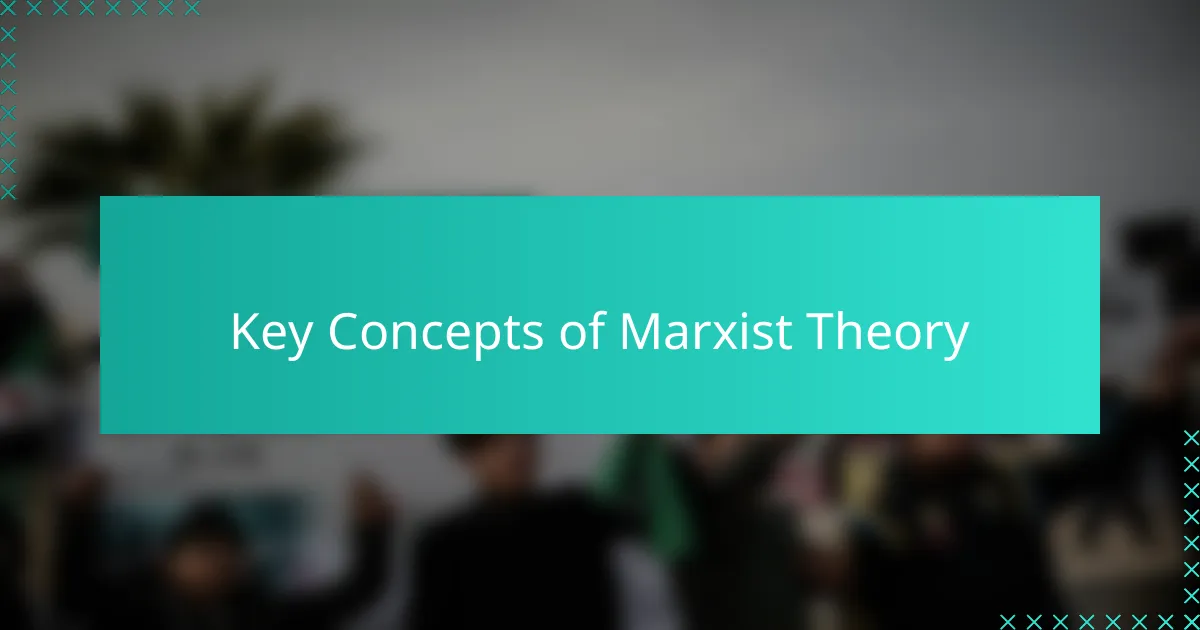
Key Concepts of Marxist Theory
Marxism’s core concept of class struggle immediately caught my attention. It suggests that history isn’t just a series of random events but a continuous conflict between those who own resources—the bourgeoisie—and those who sell their labor—the proletariat. Have you ever thought about how this struggle shapes not only individual lives but entire nations? Understanding this made me see global politics as a battlefield of economic interests.
Another key idea that struck me was the notion of surplus value—the difference between the work people do and the wages they receive. It felt like uncovering an economic injustice that’s often invisible but fundamental to how capitalism operates. I started questioning why so much wealth seemed to concentrate at the top while so many struggled, realizing this wasn’t a coincidence but a built-in feature of the system.
Lastly, the concept of historical materialism challenged how I viewed societal change. Instead of ideas alone driving history, Marxism argues that material conditions and economic realities shape everything. This made me reflect: could addressing economic inequality really transform political systems? It felt empowering and daunting at the same time, knowing that change requires shifting the very foundations of society.
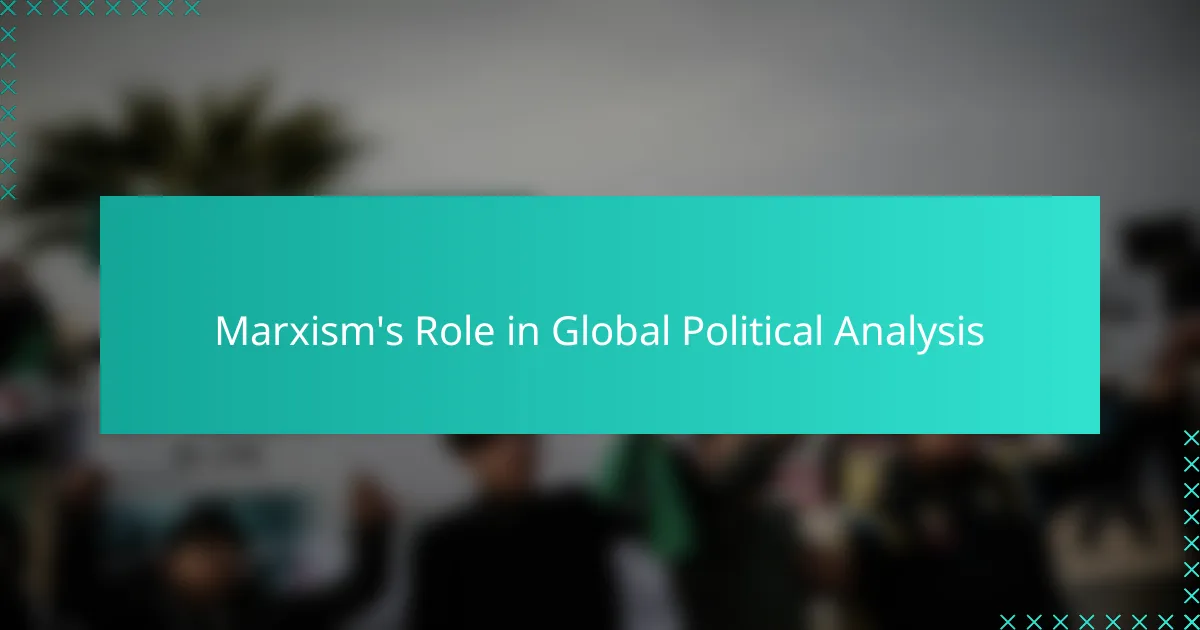
Marxism’s Role in Global Political Analysis
Marxism’s role in global political analysis became clearer to me when I saw it as a powerful tool to decode the hidden economic dynamics shaping international relations. It’s not just about governments or wars; it’s about how wealth and power circulate on a global scale. I found myself asking, how often do we overlook the influence of capitalism’s global reach when analyzing conflicts or alliances?
What struck me most was how Marxism exposes the connection between capitalism and imperialism—the way powerful nations extend control over weaker ones to maintain economic dominance. This perspective made sense of many global tensions that seemed puzzling before. Could it be that so much of what we call “foreign policy” is really about protecting capitalist interests abroad?
At times, grappling with Marxism’s analysis of global class struggle felt overwhelming. But it also gave me hope, because understanding these forces means we’re not helpless observers. If economic structures drive political outcomes, then changing those structures could rewrite the rules of global engagement entirely. Isn’t that a powerful idea worth exploring?
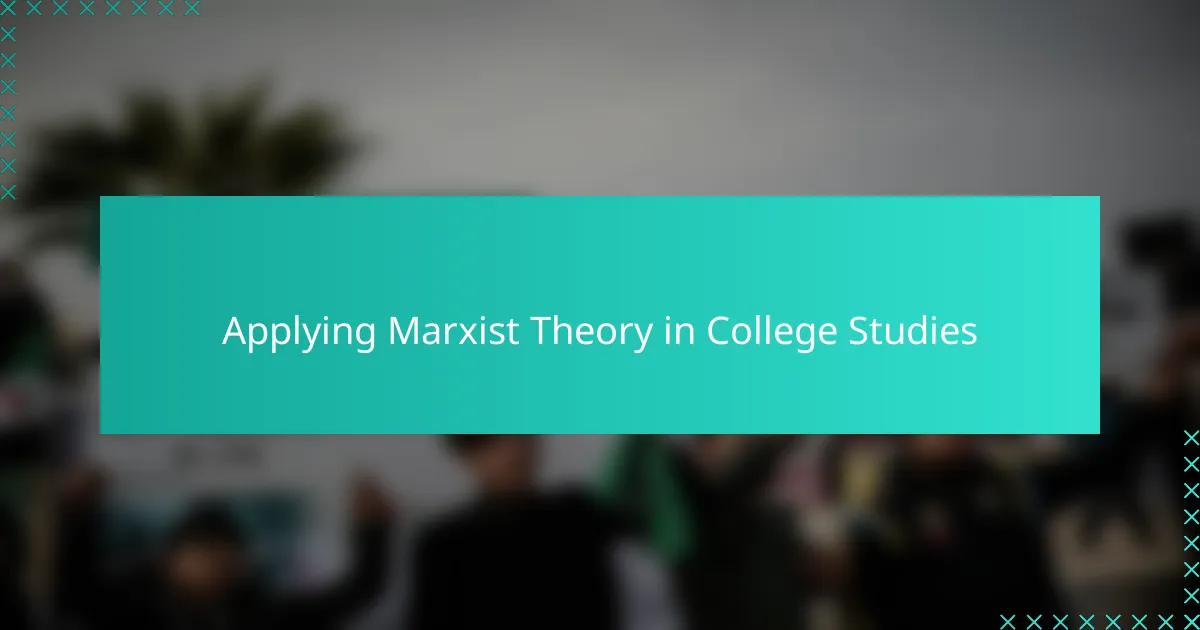
Applying Marxist Theory in College Studies
Applying Marxist theory in my college studies transformed how I approached assignments and discussions. Instead of accepting political events at face value, I began dissecting them through class dynamics and economic interests. It felt like uncovering a secret layer beneath everyday politics, revealing who benefits and who loses.
I remember a seminar where we analyzed a recent trade agreement; applying Marxist concepts made the economic motivations clear and unsettling. Why did certain countries push hard for terms that seemed harmful to their workers? This firsthand experience showed me that Marxism isn’t just abstract theory—it’s a practical tool for critical thinking.
Sometimes applying Marxist analysis challenged me emotionally, especially when facing the harsh realities of exploitation and inequality embedded in global systems. Yet, it also sparked a sense of responsibility and curiosity: how can I contribute to imagining fairer alternatives within the academic conversations and beyond? This tension kept my studies deeply engaging and relevant.

Case Studies from College Research
One case study that really stuck with me involved examining the garment industry in Southeast Asia. Using Marxist theory, I could see how multinational corporations extract surplus value at the expense of local workers, who endure poor wages and conditions. Didn’t it feel like a vivid example of global capitalism’s exploitative reach? This research made abstract concepts suddenly tangible.
Another study explored land reform struggles in Latin America. Looking through a Marxist lens, I realized these conflicts weren’t just about property but about who controls the means of production. It felt powerful to connect historical materialism directly to people’s everyday fight for justice. Have you ever thought about how these localized disputes reflect bigger economic systems?
The most challenging project was analyzing post-colonial trade patterns. I discovered how imperialism morphs into modern economic dependence, shaping underdevelopment in formerly colonized countries. Grappling with these realities was emotionally tough but enlightening—it taught me that Marxism isn’t just theory, but a call to recognize and resist ongoing inequalities in global politics.

Personal Experiences Exploring Marxism
At first, diving into Marxism felt like entering a whole new world—one where I had to challenge many of my old assumptions. I remember sitting late in the library, wrestling with Marx’s writings, wondering how a 19th-century thinker could still explain so much about today’s global politics. Did I really understand the weight of class struggle until I saw how it played out not just in theory, but in the newspapers and my own country’s history?
There was a moment during a group discussion that stuck with me. As we debated capitalism’s role on the international stage, I felt a mix of frustration and hope. Frustration, because acknowledging exploitation is uncomfortable. Hope, because recognizing these patterns means there’s room for change. Have you ever felt torn like that when confronting harsh truths?
Sometimes, I found myself emotionally drained, especially when exploring how deeply economic inequalities are woven into global systems. Yet, this journey also gave me a new lens to see political events—not as isolated crises, but as parts of a larger story about power and resistance. That shift made me realize: understanding Marxism wasn’t just academic; it was personal and urgent.
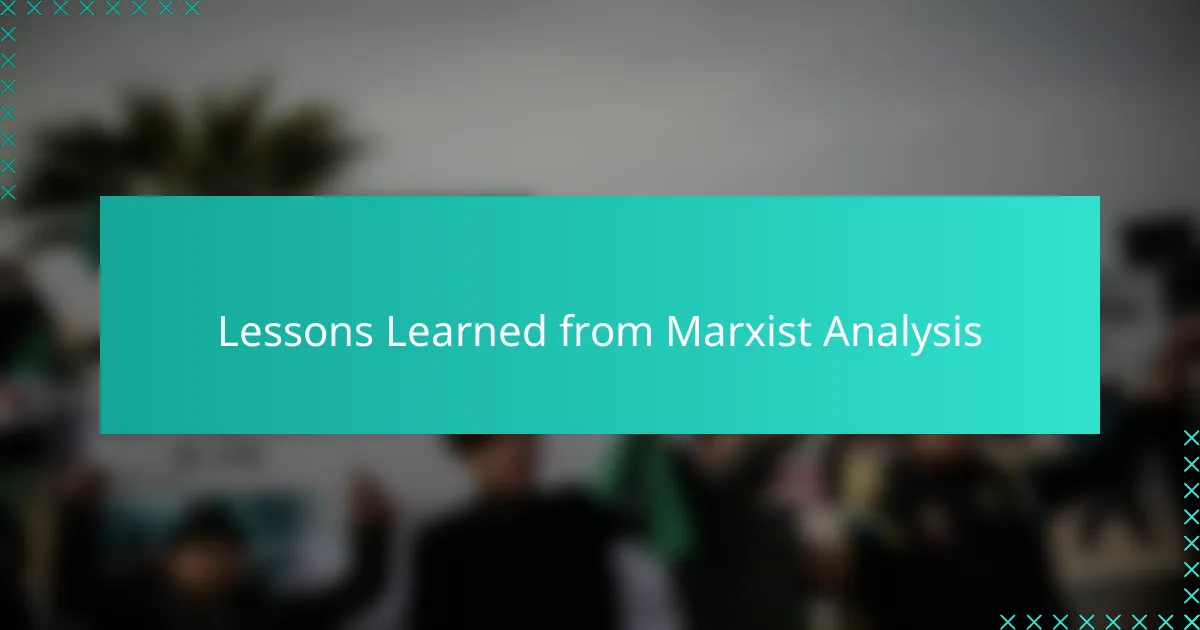
Lessons Learned from Marxist Analysis
What I learned most profoundly from Marxist analysis is how deeply economic power shapes every aspect of society. It made me see inequalities not as isolated problems but as symptoms of a system designed to benefit a few. Have you ever paused to think about why wealth seems so concentrated and how that concentration influences politics and daily life? For me, this realization was both unsettling and eye-opening.
Another lesson was recognizing the importance of class struggle as a continuous force driving historical and political change. This perspective shifted my focus from individuals to broader social forces, highlighting how conflicts are often rooted in competing economic interests. It made complex global events feel more understandable and less random.
Finally, Marxist theory taught me the value of critical skepticism toward accepted narratives. Questioning who benefits from political decisions became a habit—I learned not to take things at face value but to dig deeper for the underlying economic motives. This approach, though sometimes disheartening, empowered me to engage with global politics more thoughtfully and honestly.
